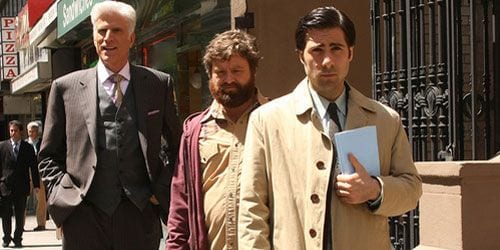
We all lead double lives.
— Ray (Zach Galifianakis)
Heartbroken and creatively blocked, writer Jonathan Ames (Jason Schwartzman) puts an ad up on Craigslist. Struggling to begin his elusive second novel, he offers himself as an unlicensed private investigator for-hire, complete with tweed sport coat and tattered copy of Farewell, My Lovely. Absurd? Absolutely. Enjoyable? You bet.
Brooklyn serves as the ideal playground for Jonathan and his best friend, internet comic artist Ray (Zach Galifianakis), seeing as they are both sensitive, talented, and self-centered artsy types who ritually argue factoid semantics over coffee. As Bored to Death begins, they are mutually supportive victims of emotional arrested development (TV shorthand for adulthood ineptitude), bonded over their respective creative torments. When Ray laments the slow deterioration of his own romantic relationship with single mother Leah (Heather Burns), Jonathan suggests that he might build some good will with her if he forfeits takes a job as a grade school art teacher to bring in steady income. “Don’t be disgusting,” Ray replies.
Jonathan’s own focus is his cases, most blandly familiar (since they are, quite literally, by-the-book). Luckily, the emotional and moral gyrations of his double life make Bored to Death more entertaining than the usual film noir parody. Making obscure literary references that no one gets, Jonathan drinks two glasses of white wine nightly, and wiggles his toes excitedly when he reads in bed. He’s too educated to be proletarian, too stoned to be hardboiled. He also manages a close friendship with George (Ted Danson), the well-manicured editor of a high profile magazine where Jonathan freelances. What George wields in literary cred, he lacks in self-confidence. His friendship with Jonathan initially reads like a mutually desperate attempt to recapture a virile youth. George serves as both father figure and frat brother, suggesting that he and Jonathan have similar effects on women (“We enthrall and then we disappoint”). The men smoke weed together in a bathroom stall during a society mixer, and George dismisses Jonathan’s worry that he may be an alcoholic, assuring him, “Men face reality, women don’t. That’s why men need to drink.”
George lifts this line from Jonathan’s novel, revealing in the series’ premiere episode some of the regressive gender politics at work in their world. Tongue-in-cheek or no, the dames here could be easily plucked straight from his 1930s detective novel urtexts. In Bored to Death, women are buxom objects, helpless victims or doting mommies, described by sexist shorthand (“She was my best ex-wife”). On a subway, Jonathan marvels at a curvy brunette by declaring, “The world is completely melting and yet beautiful women are still being produced.”
These political hiccups are unfortunate, but not deal-breakers. Bored to Death is undeniably smart, and so it could very well be laying the groundwork for all these wincing moments to be properly unpacked by an apt post-modern femme fatale (mom?). Created by nebbish writer Jonathan Ames, the series indulges a decidedly male fantasy for New York creative intellectualism in the same way Entourage does for Hollywood’s struggling actors-turned-stars. And yet, however much Bored to Death burps the erudite men-children it’s raising, it still refuses them any substantive comfort. This deficit is exemplified in Ray, with eyes bloodshot from weeping or a hangover or both, as he demands, “I want to be put to sleep. I want to be tucked in. I want to be the only child in a woman’s life.”

![Call for Papers: All Things Reconsidered [MUSIC] May-August 2024](https://www.popmatters.com/wp-content/uploads/2024/04/all-things-reconsidered-call-music-may-2024-720x380.jpg)



